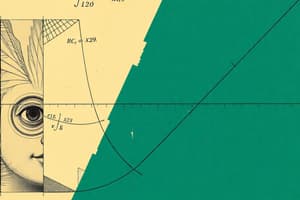Podcast
Questions and Answers
What is the correct relationship for the z-coordinate in spherical coordinates?
What is the correct relationship for the z-coordinate in spherical coordinates?
- $z = ρ cos φ$ (correct)
- $z = ρ^2 sin φ$
- $z = ρ sin φ sin θ$
- $z = ρ sin φ cos θ$
Which expression correctly represents the volume element in spherical coordinates?
Which expression correctly represents the volume element in spherical coordinates?
- $dV = ρ^2 sin φ dρ dφ dθ$ (correct)
- $dV = ρ^2 dρ dφ dθ$
- $dV = ρ sin φ dρ dθ dφ$
- $dV = ρ^3 dρ dθ dφ$
Why is it important to analyze the boundaries of a region when setting up triple integrals?
Why is it important to analyze the boundaries of a region when setting up triple integrals?
- To determine the order of operations for differentiation.
- To identify which coordinate system is always the most complex.
- To entirely avoid using the spherical coordinate system.
- To ensure that the integration limits are accurate and reflect the actual region. (correct)
When selecting an appropriate coordinate system for integration, which factor is most relevant?
When selecting an appropriate coordinate system for integration, which factor is most relevant?
What is the effect of the order of integration in triple integrals?
What is the effect of the order of integration in triple integrals?
What is the primary purpose of using triple integrals?
What is the primary purpose of using triple integrals?
Which option correctly represents the volume element in rectangular coordinates for triple integrals?
Which option correctly represents the volume element in rectangular coordinates for triple integrals?
What determines the choice of order of integration in triple integrals?
What determines the choice of order of integration in triple integrals?
Which coordinate system is particularly useful for regions with axial symmetry?
Which coordinate system is particularly useful for regions with axial symmetry?
In spherical coordinates, what does the angle φ represent?
In spherical coordinates, what does the angle φ represent?
Which of the following is a valid application of triple integrals?
Which of the following is a valid application of triple integrals?
What does the variable ρ represent in cylindrical coordinates?
What does the variable ρ represent in cylindrical coordinates?
What is the general form of a triple integral over a volume V?
What is the general form of a triple integral over a volume V?
Flashcards
Spherical Coordinates
Spherical Coordinates
A coordinate system that uses radial distance (ρ), polar angle (φ), and azimuthal angle (θ) to define a point in 3-dimensional space.
Volume element (spherical)
Volume element (spherical)
The infinitesimal volume element in spherical coordinates, used in triple integrals.
Coordinate System Choice
Coordinate System Choice
Selecting the appropriate coordinate system (rectangular, cylindrical, or spherical) to simplify triple integral calculations based on the problem's geometry.
Integration Limits
Integration Limits
Signup and view all the flashcards
Order of Integration
Order of Integration
Signup and view all the flashcards
Triple Integrals
Triple Integrals
Signup and view all the flashcards
Iterated Triple Integrals
Iterated Triple Integrals
Signup and view all the flashcards
Triple Integral General Form
Triple Integral General Form
Signup and view all the flashcards
Cylindrical Coordinates
Cylindrical Coordinates
Signup and view all the flashcards
Spherical Coordinates
Spherical Coordinates
Signup and view all the flashcards
Order of integration
Order of integration
Signup and view all the flashcards
Volume Element (dV)
Volume Element (dV)
Signup and view all the flashcards
Applications of Triple Integrals
Applications of Triple Integrals
Signup and view all the flashcards
Study Notes
Introduction to Triple Integrals
- Triple integrals are used to calculate volume or evaluate functions in three dimensions.
- They extend the concept of double integrals to three dimensions.
- The fundamental concept is to divide the volume into infinitesimally small rectangular boxes.
- The function's value is multiplied by the volume of a box, and the process is repeated over the entire region.
- The integral then sums up all these contributions.
Iterated Triple Integrals
- Triple integrals are evaluated as iterated integrals.
- The order of integration can be changed to:
- dz dy dx
- dx dy dz
- dy dx dz
- and other permutations
- The limits of integration define the region in three-dimensional space.
- The choice of order often depends on the shape of the region.
Calculating Triple Integrals
- The general form for a triple integral over a region V is: ∫∫∫V f(x, y, z) dV
- dV typically represents a small volume element, often given as dx dy dz in rectangular coordinates.
- Use the defined region to determine the integration limits.
- Carefully analyze the region's shape. The shape dictates the way you should set up the limits for the triple integral.
Applications of Triple Integrals
- Calculation of volume of irregular shapes.
- Calculating mass of three-dimensional objects, if the density is given as a function of coordinates.
- Calculating the average value of a function over a volume.
- Center of mass calculations for three-dimensional bodies.
Triple Integrals in Cylindrical Coordinates
- Cylindrical coordinates are useful in situations with axial symmetry.
- They introduce the new variables:
- ρ (rho), representing the radial distance from the z-axis.
- θ (theta), representing the angle in the xy-plane.
- z, representing the height.
- The relationships between rectangular and cylindrical coordinates are:
- x = ρ cos θ
- y = ρ sin θ
- z = z
- The volume element in cylindrical coordinates is: dV = ρ dz dρ dθ
Triple Integrals in Spherical Coordinates
- Spherical coordinates are often used when dealing with spheres or regions with spherical symmetry.
- The coordinates are:
- ρ (rho), representing the distance from the origin.
- θ (theta), representing the angle in the xy-plane, similar to cylindrical coordinates.
- φ (phi), representing the angle from the positive z-axis.
- The relationships between rectangular and spherical coordinates are:
- x = ρ sin φ cos θ
- y = ρ sin φ sin θ
- z = ρ cos φ
- The volume element in spherical coordinates is: dV = ρ2 sin φ dρ dφ dθ
Evaluation Procedures
- Recognize the coordinate system appropriate for the problem.
- Set up the limits of integration based on the region defined.
- Substitute the conversion formulas if necessary.
- Evaluate the iterated integral, following the chosen order of integration.
Key Concepts
- Integral order choice matters for the limits of integration.
- Use the appropriate coordinate systems (rectangular, cylindrical, or spherical) to optimize calculations.
- Analyze the boundaries of the region and their relationships to the coordinates to ensure proper integration limits.
- Careful understanding of the region of integration is crucial for accurate limits.
Examples
- Various examples involving specific regions and functions would be required to demonstrate the application of these concepts. The specific examples are problem-dependent.
- Illustrative examples can be provided to show how to apply these triple integrals for calculating specific volumes or averages in 3-D space.
Studying That Suits You
Use AI to generate personalized quizzes and flashcards to suit your learning preferences.





